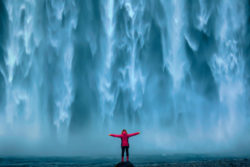From my forthcoming book Seeking the Way, due out very shortly – an adaptation, with several new reflections, of The Teacher for use in Quiet Days, here’s an exploration of issues of human need and suffering, asking if we have eyes to see and a heart to respond.
If there’s one problem people have wrestled with across the centuries, it is that of suffering and human need? For religious believers it is most troubling of all, for it seems to fly in the fact of their teaching of a God of love and compassion? Another tsunami in Indonesia; another earthquake or erupting volcano; another flood or drought; another conflict and attempted genocide; another person dying of cancer … and so we could go on. How do we make sense of it? Is there some overarching explanation that can help to square the circle, reconciling faith and reality? Or must we learn to live with the inexplicable, recognising that we will never have all the answers, let alone all the solutions? Our final reflection considers the problem further.
Reflection
I saw scenes of suffering on the news report, too dreadful to contemplate. Children emaciated by hunger, eyes sunken, listless – waiting for the cold embrace of death. Parents weeping for their loved ones – despairing, desperate.
I saw images of violence, war and hatred: hundreds slaughtered; thousands fleeing as refugees.
I saw communities ravaged by disease, faces twisted in pain, life ebbing from broken bodies.
I saw families living in shanty towns and hovels, eking out a living among the dirt and squalor.
I saw countries overwhelmed by flood, famine, earthquake – lives shattered in an instant.
And I said to the Teacher, ‘How can this be? Is there no one to help?’
Then the Teacher looked at me sadly, with eyes full of pain. And that look spoke of lives racked by sickness, broken by war, destroyed by prejudice, denied by injustice, scarred by hatred, diminished by poverty, haunted by fear, shattered by bereavement, wracked by worry – so much sorrow and suffering endured by so many. And the Teacher answered: ‘Truly the troubles people face hang heavy upon them.’
‘But could those not be avoided?’ I protested. ‘The poverty, the violence, the lack of food and medicine – surely we can make a difference!’
Again, the Teacher surveyed me sorrowfully. ‘I have seen all kinds of oppression practised under the sun. See: the tears of the victims – no one is there to offer them succour.’
‘But why?’ I asked. ‘Does no one care?’
‘The poor beg for help,’ continued the Teacher, ‘but the wealthy respond harshly to them. One person lords it over another, to the other’s detriment.’
‘So suffering is down to us?’ I asked. ‘Is that what you’re saying? A result of greed and power.’ Then the Teacher sighed, with a shake of the head. ‘No one can anticipate when disaster might strike. Just as fish are captured in an unforgiving net, and birds trapped in a snare, so mortals are caught out by catastrophe that unexpectedly comes crashing down upon them. No one know what the future holds; who could ever predict that? Nobody is strong enough to control or restrain the wind, or to hold back the day of their death.’
Yet I saw also that so much pain and sorrow could indeed be avoided if only we had the will: that the wealth of a few rests on the poverty of many; the strong trample over the weak; the comfortable ignore the needy.
And I saw that though some truly care, and many give generously, more is needed; that to effect real change, the causes of suffering must be tackled – not just the symptoms. For while a bandage over the wound may bring relief, surgery may be needed to bring healing. And though charity may serve to paper over the cracks, it cannot forever hide them.
Unless we seek justice for the oppressed, the disenfranchised and the weak, our talk of a better world is empty. Unless we help the needy to help themselves, we are no help finally to any of them. Then, and only then, can there be sunshine after rain, light after darkness, laughter after tears, hope after despair.
The lesson, then, is this: that disaster can strike anyone, any time, for no reason we can fathom – the good and the bad, the just and the unjust, But though suffering is a part of life – a puzzle, a mystery, for which we seek answers in vain – it can, sometimes, be lifted, even prevented, if only we have eyes to see and a heart to respond.
